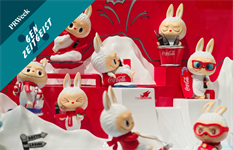I finally caved and bought two Labubus.
If you’ve missed it, Labubus are quirky vinyl figurines produced by Pop Mart and sold in blind boxes that hide which figure you’re getting until opened. After seeing friends and influencers flooding TikTok, X and Instagram with unboxing videos, Sisi from the “Have a Seat” collection and Sesame Bean from the “Exciting Macaron” series are now staring at me from my office desk.
Like most Gen Z trends, Labubus moved from niche interest to mainstream obsession overnight. And, naturally, brands are eager to jump in.
Some collabs have genuinely captured Labubu’s chaotic energy. Pop Mart’s Coca-Cola-themed Labubus are perfect examples. The winter-themed figurines, wrapped in tiny scarves and holding glass soda bottles, vanished from shelves in minutes. The collaboration worked because it told a relatable story and felt organic — not overly corporate.
@diamondmsimons Watch until the end! Perfect for the Coca-Cola corner! ♥️✨ @POP MART @POP MART US @POP MART US SHOP @POP MART US Localshop #Labubu #labubuthemonsters #labubuunboxing #labubucocacola #cocacolalabubu #cocacola #coke #popmart #popmartunboxing #blindboxes #unboxing #asmr #unboxingasmr #notalkingasmr #foryou #fyp ♬ Ooh La La – Josie Dunne
Another recent success came from Korean pop group Seventeen, which auctioned limited-edition Labubus in branded outfits, turning a collectible into a community-driven charity event.
The flood of “Lafufu” knockoffs, or cheap, off-model Labubus aspiring to emulate the fanfare through branded merch and accessories have become social media gold. The makeshift figures have inspired memes and collector banter, including breakdown articles detailing fan commentary on the quirks and differences between Labubus and Lafufus such as the face color tone, blurry paint and mismatched teeth.
Yet, not all of Pop Mart’s character and brand collaborations — knockoff or legit — have been received positively. The company’s partnership with legacy characters like Snoopy felt calculated rather than creatively inspired, losing buzz almost as quickly as it appeared. These misfires teach a critical PR lesson: Gen Z senses forced authenticity instantly. If the partnership feels more like a branding exercise than a genuine cultural moment, audiences won’t engage.
Labubu’s bootleg cousin Lafufu, highlights another valuable PR insight: fandoms love an inside joke. Since the height of the Labubu craze, Lafufu knockoffs have flooded online marketplaces, quickly becoming meme-worthy collectibles.
@littlecajunhouse The LAFUFUS v/s LABUBUS #lafufu #labubu #real #fake #popmart ♬ original sound – Little Cajun House
Celebrities who have jokingly endorsed the knockoffs have created a secondary wave of viral attention. When Kim Kardashian’s son begged Pop Mart for “giant Labubus,” social media answered immediately with Lafufu memes, turning a potential copyright nightmare into valuable, organic buzz.
For PR professionals and brand strategists, Labubu’s success underscores crucial lessons for brands looking to tap into trending products and internet moments. Scarcity combined with social media anticipation often outpace paid media efforts. Partnerships need to feel authentic and respectful of the original audience’s fandom in order to succeed. And, sometimes bootlegs, memes and parody versions can enhance a brand’s narrative rather than dilute it.
The Labubu trend isn’t slowing down and neither should brands. PR teams need to approach this rising wave thoughtfully. Aligning campaigns with genuine enthusiasm rather than chasing hype ensures lasting loyalty among a notoriously discerning Gen Z audience. So, does your brand want to be identified as a true Labubu or just another Lafufu?
Chris Do is an associate brand manager at Rave Restaurant Group.


